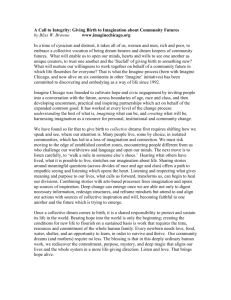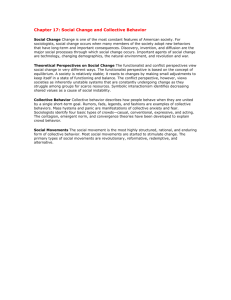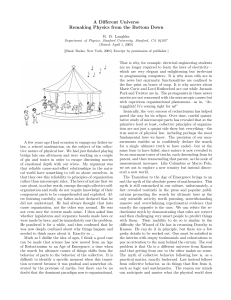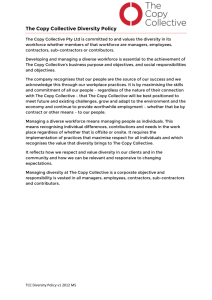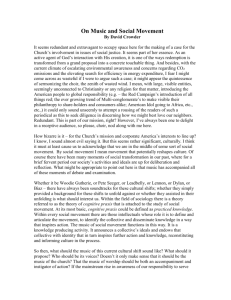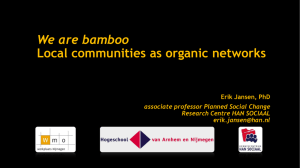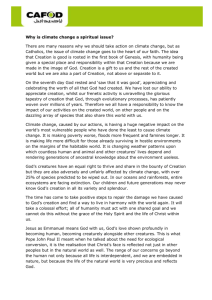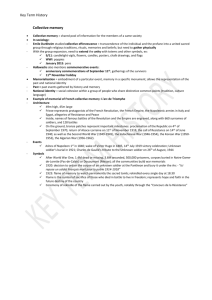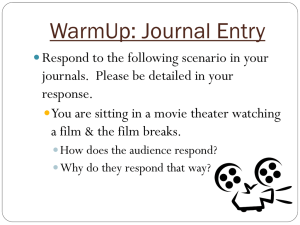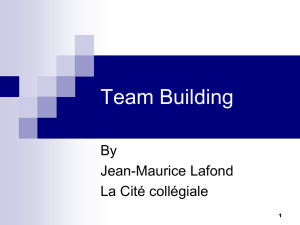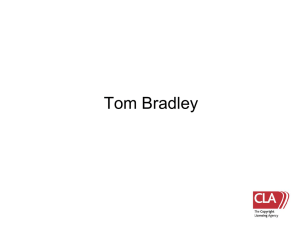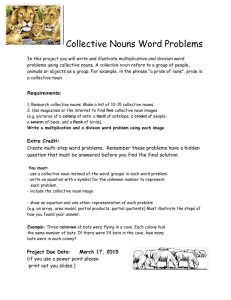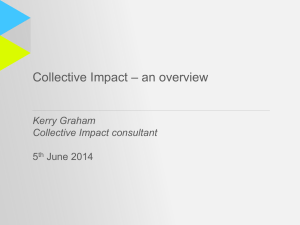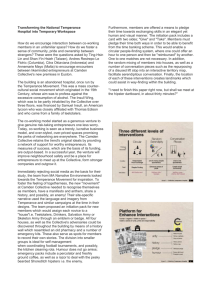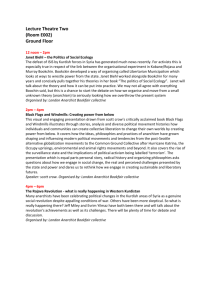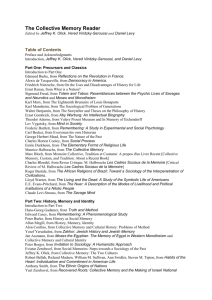Instructions: As you read “The Collective Experience” by Stuart Vail
advertisement
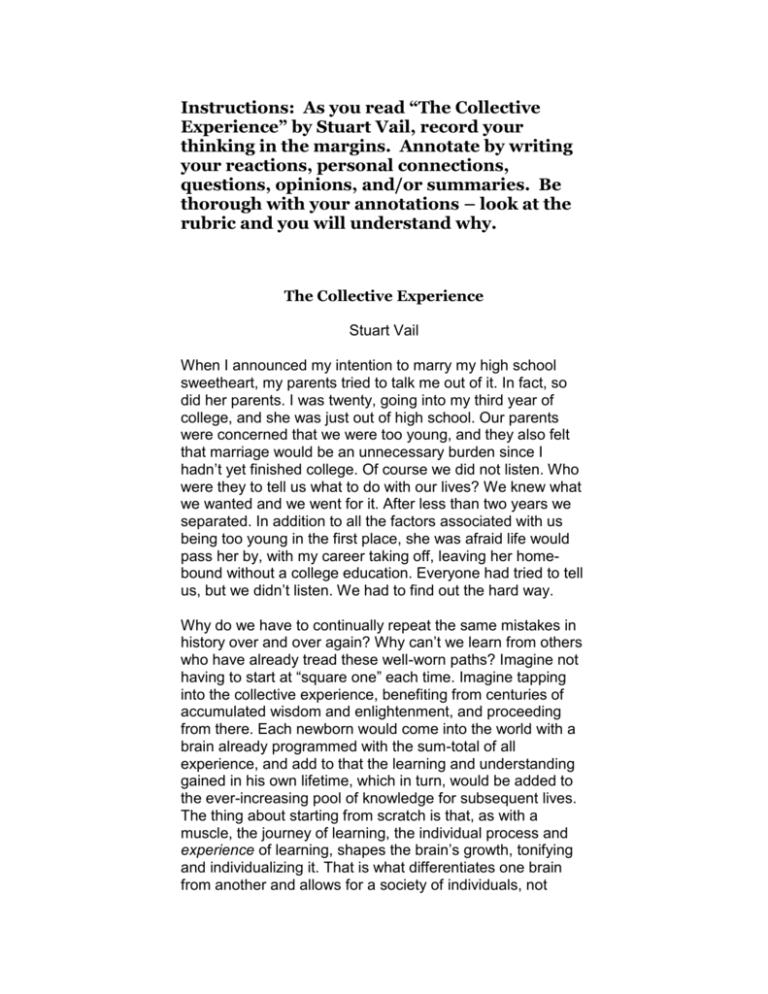
Instructions: As you read “The Collective Experience” by Stuart Vail, record your thinking in the margins. Annotate by writing your reactions, personal connections, questions, opinions, and/or summaries. Be thorough with your annotations – look at the rubric and you will understand why. The Collective Experience Stuart Vail When I announced my intention to marry my high school sweetheart, my parents tried to talk me out of it. In fact, so did her parents. I was twenty, going into my third year of college, and she was just out of high school. Our parents were concerned that we were too young, and they also felt that marriage would be an unnecessary burden since I hadn’t yet finished college. Of course we did not listen. Who were they to tell us what to do with our lives? We knew what we wanted and we went for it. After less than two years we separated. In addition to all the factors associated with us being too young in the first place, she was afraid life would pass her by, with my career taking off, leaving her homebound without a college education. Everyone had tried to tell us, but we didn’t listen. We had to find out the hard way. Why do we have to continually repeat the same mistakes in history over and over again? Why can’t we learn from others who have already tread these well-worn paths? Imagine not having to start at “square one” each time. Imagine tapping into the collective experience, benefiting from centuries of accumulated wisdom and enlightenment, and proceeding from there. Each newborn would come into the world with a brain already programmed with the sum-total of all experience, and add to that the learning and understanding gained in his own lifetime, which in turn, would be added to the ever-increasing pool of knowledge for subsequent lives. The thing about starting from scratch is that, as with a muscle, the journey of learning, the individual process and experience of learning, shapes the brain’s growth, tonifying and individualizing it. That is what differentiates one brain from another and allows for a society of individuals, not assembly line robots. However, with that wonderful individuality comes the risk of being misshapened by an abusive parent, sibling, spouse, teacher, peer group, and anyone else throughout life who happens to pass-on their potentially pathetic two-cents-worth of influence. Imagine what we could really learn if we didn’t have to continually worry about, and labor under, the negative influences of others. Poor teenagers: they spend most of their time trying to “fit in,” trying to be “cool.” They incessantly worry about acne, fashion, cars, social status, hair styles, girls/boys, drugs, sex, and money. It seems very familiar, because isn’t that list of worries the same that obsesses adults? Teens, however, have the incredible opportunity of having really nothing to do: no responsibilities other than learning at school. Available to them is a wealth of ideas and concepts, histories of civilizations, complex and fascinating mathematical systems, colorful languages, and the rich world of art—a virtual cornucopia of luscious brain food—yet they ignore and discard most of what is offered to them in their attempts to “fit in.” Nothing or no one can tell them that they are throwing away a golden opportunity. They have to learn the hard way. Their homework is barely done—if at all—and the lessons presented in class are forgotten. Textbooks are barely given the chance to flower in their glory, even though what they have to offer is a vast, priceless array of riches. In knowledge one possesses power, or the potential for power. But alas, the books suffer disuse. They are dead weights hauled from class to class, maybe never to go from school locker to home. The words inside, having been carefully crafted into sentences housing great reward, silently call to be released. If the “deaf and blind” students would only allow those words to complete their mission, their worlds would change. The antidote to all their petty, self-absorbing problems is right in their hands, those dead weights they grudgingly haul from class to class to class.... Allow the words to complete their mission. Imagine! The collective experience is in our hands: books. It’s all there. But who reads anymore? As a culture, we prefer to have television and movies educate us and our young: history according to Disney and Oliver Stone. Now there’s a perspective! Our over-the-top, in-your-face, THX “the audience is listening,” fast-edit, break-the-sound-barrier- paced movies are creating a generation of kids who now expect those same special effects in every aspect of life. That’s why they have to fill the gaps between movies with trips to Universal Studios, Disneyland, water parks, video arcades, Nintendo games—anything, as long as it is loud and fast-paced. No wonder they can’t sit quietly and read a book. No wonder words, simple words, can’t compete—or can’t complete their mission to illuminate. There’s no one home, the inn is vacant: there’s not a soul to receive their message. Consider the plots of many of today’s top films. Consider the lack of character development and the actual dialogue the actors have to say. Not much there. The writers lack a knowledge of words, a knowledge of the history of words, and a wisdom gained only from the implementation of that knowledge. Yet, most young filmmakers grew up on the very trash they are trying to make. By all the signs, their own textbooks probably sat unopened in their lockers at school while they stayed up for hours after bedtime trying to beat the latest computer game. If they had spent only half of that time and energy reading some of the writings of Plato, Rumi, da Vinci, Rilke, and Joseph Campbell, all wonderful contributors to the collective experience, they would be ten times the filmmakers they are today. The real tragedy is that there are no words in their lives, no understanding of real literature, art, science, and history; and the only tools they have to fill the void are fast edits and push-the-envelope special effects. The collective experience is right under their noses, but no one can lead them to it. They will have to learn the hard way. Assignment: Write three paragraphs that address the 3 questions: 1. What does it say? (What is the text about?) 2. What does it mean? (to those identified in the text) 3. Why does it matter? (What important understanding emerges from the text. Be sure you are thorough in your response. Staple your annotations to your written response and submit.

